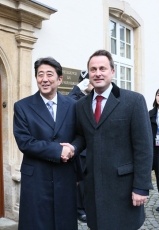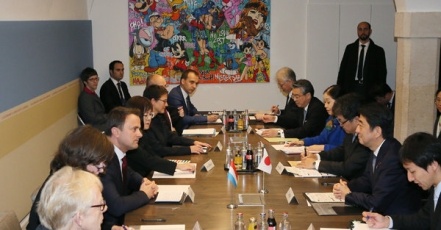Japan-Luxembourg Relations
Japan-Luxembourg Summit Meeting
 (Photo : Cabinet Public Relations Office)
(Photo : Cabinet Public Relations Office)
 (Photo : Cabinet Public Relations Office)
(Photo : Cabinet Public Relations Office)
 (Photo : Cabinet Public Relations Office)
(Photo : Cabinet Public Relations Office)
On December 1, commencing at 2:00 p.m. (local time) for approximately 50 minutes, Mr. Shinzo Abe, Prime Minister of Japan, held a summit meeting with H.E. Mr. Xavier Bettel, Prime Minister of the Grand Duchy of Luxembourg, during his visit to that country. The overview is as follows.
1. Opening remarks
Prime Minister Bettel welcomed Prime Minister Abe, and Prime Minister Abe replied that bilateral economic relations made significant progress as a result of Prime Minister Bettel’s visit to Japan in July, and that he was happy to become the first Japanese Prime Minister to visit Luxembourg in a bilateral context less than six months following that. In addition, Prime Minister Abe expressed his happiness that the close and longstanding relationship between the Imperial Family of Japan and the Grand Ducal Family of Luxembourg formed the foundation for the friendly relations between the two countries, and explained that he was honored to meet T.R.H Crown Prince Guillaume and Crown Princess Stéphanie of Luxembourg when they visited Japan in October last year. In response, Prime Minister Bettel also highly appreciated the first visit to Luxembourg by a Prime Minister in a bilateral context, and the two leaders shared the view that they would further advance the bilateral relations.
2. Bilateral relations
Prime Minister Abe mentioned the visit by the Keidanren (Japan Business Federation) mission in October, explained that he was decisively implementing reforms in order to make Japan the best country in the world for doing business, and expressed his expectation of bidirectional investment and further investment in Japan, for the growth of both countries. In response, Prime Minister Bettel expressed interest in Japan’s economic revitalization, and displayed strong interest in strengthening economic relations with Japan, noting that Luxembourg is a small country but is the gateway to Europe.
Additionally, Prime Minister Abe explained that he intended to implement discussions at the working level on the possibility of concluding a bilateral aviation agreement, and in response Prime Minister Bettel highly appreciated the idea.
3. Japan-European Union (EU) relations
Prime Minister Abe stated that the 12th Asia-Europe Meeting (ASEM) Foreign Ministers’ Meeting (ASEM FMM12) held in Luxembourg last month produced significant outcome, and he expressed his respect for Luxembourg’s efforts as the host country. The two leaders shared the view that they would aim to realize the Japan-EU Economic Partnership Agreement (EPA) as soon as possible next year, and will also aim to conclude the Japan-EU Strategic Partnership Agreement (SPA) promptly. Furthermore, Prime Minister Abe appreciated the easing of restrictions on importing food and other items produced in Japan, including those from Fukushima Prefecture, and expressed expectation of further easing.
Prime Minister Abe explained that the Legislation for Peace and Security that Japan enacted recently enabled Japan to make greater contributions to the peace and stability of the international community, through such ways as United Nations(UN) Peacekeeping Operations (PKOs) and logistical support, and that this would contribute to strengthening cooperation with the EU also. In response, Prime Minister Bettel expressed support for Japan’s policy of Proactive Contribution to Peace , and explained his understanding that the Legislation for Peace and Securities is a law for preserving peace.
5. Cooperation in the international arena
(1) UN Security Council (UNSC) reform
Prime Minister Abe welcomed the appointment of H.E. Ms. Sylvie Lucas, Ambassador and Permanent Representative of Luxembourg to the United Nations, as the Chair of the Intergovernmental Negotiations on UNSC Reform. He explained that Japan continued to place importance on UNSC reform for enhancing representation and legitimacy. He further stated that in this year which marks the 70th anniversary of the founding of the UN, the G4 member including Japan held a summit meeting for the first time in 11 years and that the momentum for reform was increasing. Prime Minister Bettel replied that the world had changed a great deal in 70 years and expressed his acknowledgement about the necessity for UNSC reform as well as support for Japan becoming a permanent member of the UNSC. In addition, Prime Minister Bettel stated that he hoped more importance should also be placed on the positions of small countries. Prime Minister Abe explained that in order to take account of small countries’ positions, it would be necessary to expand both permanent and nonpermanent membership.
(2) Counterterrorism
Prime Minister Abe firmly condemned the terrorist attacks in Paris, and stated that it was important to make multifaceted efforts to counter terrorism, such as improving countries’ counterterrorism capabilities, measures to combat the violent extremism that forms the foundation for terrorism, and building societies that do not give rise to extremism, and he explained that Japan would contribute to preventing and eradicating terrorism. Prime Minister Bettel highly appreciated Japan’s assistance for refugees and displaced persons, and stated that terrorism is an attack on the fundamental values of our society and that it was important to show prospects for the future to preventing terrorism. He explained that the Government of Luxembourg was striving to create employment and noted that intergovernmental cooperation on the information exchange front was needed.
(3) Climate change
Prime Minister Abe explained that Japan placed overriding importance on building a fair and effective framework in which all countries participate and in order to encourage participation of developing countries, Japan had pledged to lift the value of its assistance from both the public and private sectors for developing countries to approximately 1.3 trillion yen a year in 2020. Prime Minister Bettel pointed out that it would be necessary to create rules that apply to all countries, and especially mentioned the risks that island countries could face from rising sea levels triggered by climate change.
6. Regional affairs
The two leaders exchanged views on stations in the East Asia situation and Ukraine. With regard to the Ukraine situation, in particular, they shared the importance of implementing the Minsk agreements.

